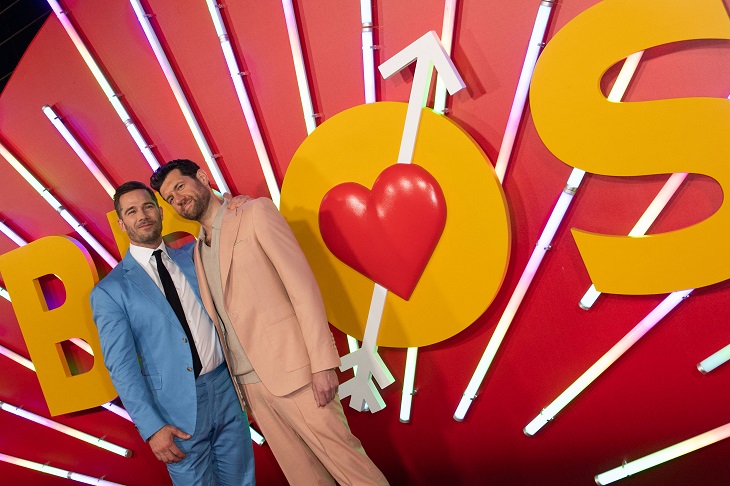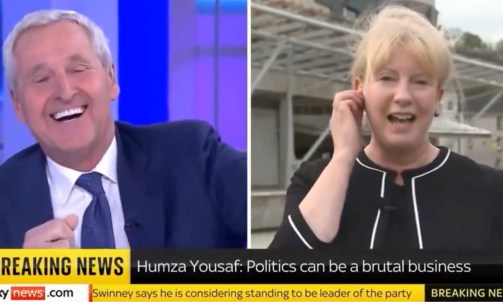Bros follows the story of a man who can’t decide if he’s one of the ‘smart’ or ‘stupid’ gays. Billy Eichner, the film’s star and co-writer, is depicted as a traditional gay cynic, who mocks the modern ‘love is love’ trope and the prospect of same-sex monogamy in the name of maintaining homosexuality’s counter-cultural edge. He fears the erasure of gay people from history books and thinks Obergefell is just another attempt to make homosexuality more palatable to the straight majority.
Eichner, a New Yorker of Jewish descent who rose to fame through his Funny Or Die game show Billy on the Street, demonstrates his knack for Jewish humour and gay cultural wit. His capacity for social criticism and self-deprecatory jabs reveal his profound insights into the nature of gay male culture and pro-LGBTQ+ rhetoric post-Obergefell.
Unfortunately, his insights never get to root of why same-sex sexuality is against the grain. This is part of the reason he caves toward the end of the film, opting for the very bourgeois romantic love story that he claimed to detest at the film’s start. To use internet parlance, Eichner’s character comes off in the beginning of the film as determinedly ‘based’ and as someone who is unafraid to speak politically incorrect truths, but ends up becoming insufferably ‘cringe’ as the film closes.
According to Jeff Berkwits, Jewish comedians have always had an egalitarian bent, tending to ‘poke fun at’ and ‘tarnish the image of’ important people in power, as well as of themselves. Thanks to their ‘neurotic self-observations’ and their ability to examine the seemingly insignificant minutiae of everyday life (rooted in training in Talmudic study), Jews are able to open people’s eyes to human errors and hypocrisy through the use of humour. Shtoch, or jab humour, says Rabbi Moshe Waldoks, is meant to ‘deflate people who consider themselves high and mighty’ – including the comedian themselves.
‘The humourist, like the prophet, would basically take people to task for their failings.’
Authority figures were often the butt of jokes as a means of defending the less powerful from exploitation, turning humour into a tool for ‘social catharsis’.
Many have noted that since his days on Billy on the Street, Eichner puts his own spin on the tradition of the Jewish comedian. Writing for Tablet magazine, Sian Gibby says that Eichner is a ‘triumph of Jewish wit, strength, and I would argue existential health’. Diverging from the ‘old trope of the outsider delivering sardonic observations; here we have not someone who sits back and comments, but davka, a guy who darts about in public, accosting innocent people, mocking them so breathlessly that he doesn’t have time to veer into actual offence’.
Gay men, writes cultural critique Camille Paglia, are often ‘arch, imperious commentators with stringent judgments about everything … the gay male brain seems to me permanently switched on’.
This affinity for provocation and sharp socio-cultural awareness is in part related to the metaphysical implications of homosexuality. ‘Homosexuality is not “normal”,’ she insists. Those ascribing to either a pagan or Judeo-Christian view of the cosmos understand that gay sex challenges nature’s design: it is positively closed off to procreation. Someone with homoerotic tendencies can either express their desires in a way that opposes nature, or can sublimate them to a supernatural end, but either way, they are inevitably caught somewhere outside the norm. Paglia critiques both bourgeois ‘humanists’ who try to normalise homosexuality and postmodern queer theorists who claim that there is no such thing as a norm.
Eichner’s wit combines both his Jewish roots and his experience as a gay man living in New York. He appears to openly mock the standard activism which has pervaded so much of popular culture, and sneeringly scoffs at phenomena like gay Hallmark movies, Glee, the demise of the ‘white cisgender gay man’, and the rise of intersectional LGBTQ+ rhetoric. He is painstakingly aware of his own flaws and faux pas, and has no qualms about poking fun at himself and other gay men’s behaviours, from the banality of anonymous Grindr hookups and their obsession with going to the gym and having the perfect body.
The film’s conflict revolves around his cynicism and overstated self-confidence. His character is not afraid to go against the grain and challenge the status quo of gay culture post-Obergefell. He thinks gay marriage is a joke, romance is a straight delusion, and he is perfectly fine with his chain of one night stands. He makes bold pronouncements about how ‘gay sex was better when straight people hated it’ and claims that gay men are either the smartest or stupidest people – meaning they either dedicate themselves to generating ingenious cultural contributions, or to chasing after hedonistic, self-indulgent pursuits.
As his character eventually falls in love and is forced to call into question his counter-cultural posturing, the audience is made to think that maybe gay men would be better off if they weren’t pompous cynics and instead allowed themselves to be more vulnerable and sentimental. And that perhaps if society learned to accept homosexuality as ‘normal’, gay men wouldn’t be as repressed and internally troubled, and thus would have no need to put up a hardened facade … maybe then everything would be better.
This is where Eichner’s character finds himself at a crossroads: become one of the smart or stupid ones, be based or cringe. Pursue the delusion that homosexuality can be lived out in a cozy, bourgeois life devoid of conflict, or accept his fate of social alienation and internal turmoil, and channel it into art – as have many others in his position, from figures past like Michelangelo and Caravaggio to more contemporary ones like Federico Garcia Lorca, James Baldwin, Oscar Wilde, Quentin Crisp, Andy Warhol, and Milo Yiannopoulos.
Paglia warns of those who want ‘to soften, to cushion, to shield minority groups from any rebuff or blow to their self-esteem. Such pampering is ultimately demeaning’. It is tension and drama, she insists, that makes for great artists.
‘Opposition and pressure enlarge and intensify personality … the most powerful, energetic personalities in America are not WASPs but blacks, Jews, and gays, all of whom are in combat with larger, perhaps unconquerable historical forces. Ease and privilege may exact their price in torpor.’
As the film progresses, he caves into a trope of homosexuality that is not only mundane and boring, but that is rather concerning and irresponsible. In an attempt to erase his inner turmoil, he insists to his boyfriend’s mother – a prim and proper suburban second grade teacher – that children should be taught gay history from a young age so as to counter feelings of being ostracised or ‘weird’. Further, his character talks openly about his sexual escapades in front of his heterosexual friends’ small children.
Those who reduce the film to merely pushing a ‘gay agenda’ miss the point. The film, rather, marks the subsuming of the ‘gay agenda’ into an even more sinister agenda: one that pushes a nihilistic, therapeutic ethos that renders all people – straight, gay, and everyone in between – more vulnerable to the efforts of mass homogenisation, and ultimately mass ‘stupidity’, by global elites. Gay men, as Eichner accurately projects, can either violently protest such an effort, or fall right into its snares. The result, should they choose the latter, is a recipe for banal unoriginality and mindless conformism.
The film’s opening weekend did not reach Eichner’s expectations, coming in at fourth and bringing in $4.8 million. He tweeted:
‘Even with glowing reviews … straight people, especially in certain parts of the country, just didn’t show up for Bros … Everyone who ISN’T a homophobic weirdo should go see BROS tonight!’
Perhaps if he tapped back into his sense of shtoch, he’d be able to laugh at the irony of the film’s box office results.
Stephen G. Adubato studied moral theology at Seton Hall University and currently teaches religion and philosophy in N.J. He also is the host of the ‘Cracks in Postmodernity’ blog and podcast. Follow him on Twitter @stephengadubato.
Got something to add? Join the discussion and comment below.
Get 10 issues for just $10
Subscribe to The Spectator Australia today for the next 10 magazine issues, plus full online access, for just $10.


























Comments
Don't miss out
Join the conversation with other Spectator Australia readers. Subscribe to leave a comment.
SUBSCRIBEAlready a subscriber? Log in